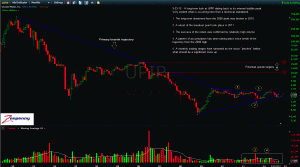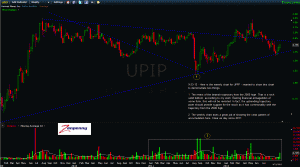RESEARCH REPORT – UPIP: A PATENT PORTFOLIO PROVIDING TREMENDOUS RISK/REWARD TO INVESTORS
Position taken on September 21st & 24th, 2012 at 1.91 - 1.98
UPIP (Unwired Planet) represents my favorite type of investment opportunity. That opportunity comes in the form of assets that are difficult, if not impossible, for the market to value correctly. In the case of UPIP, those assets are in the form of 200 patents and 75 pending patent applications.
UPIP was formerly known as OpenWave, trading under the symbol OPWV. Most technology investors who have been around for sometime should be familiar with OPWV. OpenWave was a highly liquid, "story" stock during the early part of 2000 due to their innovative wireless technology. They were, in fact, THE preeminent force in wireless back in the days when Apple was coming up with the concept of the IPod and Google was solely a search engine.
OPWV is an almost 20 year old company. In those 20 years, they pioneered many of the technologies that are instrumental to what has become our daily routine of text messaging, accessing unlimited information from our phones, while remaining connected 24/7. They were, in fact, the first company to deliver mobile internet browsing through a partnership with AT&T in 1996.
Needless to say, being a pioneer in an industry that was to become the platform for future connectivity made OPWV into a technology behemoth. At the Nasdaq bubble peak, in March of 2000, OPWV sported a split adjusted stock price of over $600, with a market cap in the many billions of dollars. By mid-2001 97% of internet ready phones in the US and approximately 75% of internet ready phones overseas used OPWV technology for accessing the mobile internet.
The company got caught in the typical early 2000 cycle of acquisition, leverage and the fantasy of infinite prosperity. We all know how that fantasy ended now. OPWV got decimated over a period of years. Their businesses were devoured whole by a wireless industry that was experiencing such rapid expansion and innovation that it left any company that couldn't keep pace in permanent purgatory.
The company has recently taken steps to restructure, in what I see as a brilliant move to capitalize on the newest technology industry: The enforcement, protection and licensing of valuable patents that have been ignored by what has become a monopolized industry dominated by Apple and Google.
Earlier this year, UPIP shed its business units through a sale to a private equity firm, leaving the company with 20 employees, 200 patents, 75 pending patents and a team of lawyers. UPIP has become a patent troll.
The company has zero debt, $80 million in cash with a market cap of $180 millon, valuing their current patent portfolio at $100 million. The only question then becomes are UPIP's patents being under or overvalued by the market here?
I am no patent expert. Far from it, in fact. Neither are you. In fact, 99% of those who read this report are not patent experts and will have no idea how to value UPIP's business. And that is exactly the point. That gigantic question mark is the opportunity in UPIP. The market has no idea how to value a patent portfolio for a company that is essentially involved in a business that didn't exist just a few years ago.
I can say with a great deal of confidence that in the current market environment it is highly unlikely that UPIP's patent portfolio is being OVERvalued by the market. The investor base simply isn't there, neither is the knowledge base.
What do those few individuals that have knowledge of UPIP's patent portfolio have to say? One opinion was issued by Alan Minsk in an article published to Forbes on June 1st, 2012. Alan Minsk practices patent law for Lane Powell in Seattle. More importantly, Mr. Minsk was formerly in-house patent counsel at OPWV. The article, "Old Model: Patents Protect Products. New Model: Patents Themselves Are Products", can be found here.
In the article, Mr. Minsk loosely assigns a value to the UPIP portfolio of patents. Here is an excerpt from the article:
The success of this approach is evident in the case of Openwave (now Unwired Planet) where I built a patent portfolio that contains families of patents, with each family directed to multiple “interpretations” of an underlying invention. This portfolio has been estimated to have a value of between several hundred million and a billion dollars, a significant portion of which is due to the additional value created by the strategies used in developing the portfolio.
I fully understand the concept of the artist overvaluing his work. However, in this case, the aggressive nature of the company in completely shedding their former business in order to become a company that essentially capitalizes on its patents seems to support his stance.
Further evidence can be found by digging through SEC filings. You cannot find any executive or member of the company discussing any valuation numbers in a conference call, press release or any other public information. Believe me, I tried.
You can find evidence of what the company *thinks* they are worth, however. Here is one piece of evidence from the 10-K for the period ended June 30, 2012, in the form of an employment contract between UPIP and Timothy Robbins (not Shawshank Redemption) who serves as General Manager of the Company’s Intellectual Property Business Unit reporting directly to the CEO:
3. Commission . You are being retained to assist the Company and its shareholders to realize maximum value for the Company’s intellectual property portfolio through the enforcement, prosecution, license and/or sale of some or all of the Company’s patents (including through a Change of Control). In lieu of participating in the Company’s Non-Executive Corporate Incentive Plan, you will be eligible for commission payments on Net Patent Proceeds, as and when collected by the Company. Commissions will be paid within 30 days after collection of the Net Patent Proceeds by the Company and the receipt and application of all Deductions. Any delay in collection of Net Patent Proceeds (such as scheduled payments running royalties or the like) shall likewise delay the payment of commissions. GAAP rules requiring deferment of recognition of revenue on payment received shall not delay payment of commissions. The schedule of commissions is as follows:
(a) Less than $100 million of aggregate Net Patent Proceeds: 1% commission
(b) $100,000,001 to $200M of aggregate Net Patent Proceeds: 1.5% commission
(c) $200,000,001 and above: 2% commission
Tier (b) and (c) of the commission breakdown are at or above the current valuation the market is assigning UPIP. Point being that the company didn't put together an employment contract with tiers that are below or even at current valuation. Management is assigning a much greater value to the patents than a market that plain and simply doesn't understand them.
On Thursday it was announced that UPIP filed suit againt both Apple and Google from their new corporate headquarters in Reno, Nevada. I know your first thought is that they moved to Reno to be close to Silver Legacy Casino and The Bunny Ranch. I'm sorry to say that you are wrong.
Moving their corporate headquarters to Nevada was a move intended to:
1. Get away from a judicial environment that is highly accommodative to Apple and Google in California.
2. Take advantage of a judicial system in Nevada that "has developed special procedures to handle complex patent cases" according to the company.
In the press release accompanying the filing of the lawsuit, Mike Mulica CEO had the following to say:
“Today’s actions follow a careful review that we launched in late 2011 as we began to transform Unwired Planet into an Intellectual Property company,” said Mike Mulica, CEO of Unwired Planet. “This litigation marks a key step in our multi-pronged strategy to maximize shareholder value through the licensing of our robust portfolio of patents and to protect our IP through litigation against unlicensed parties as necessary.”
“Apple and Google generate substantial revenues from devices and services that rely on the intellectual property that Unwired Planet developed and patented over the last 15 years. They should compensate us for the use of our patented technologies, which are foundational to mobility,” Mulica said. “As we have recently announced, we are relocating our operations to Nevada, a business-friendly, cost-effective and convenient location. Nevada has been chosen as one of 14 districts across the United States as a pilot patent district and it has developed specialized procedures to handle complex patent cases. As a result, we believe the Nevada district will be an ideal venue to resolve this matter with efficiency and expertise.”
It is worth noting that there is an unusually high hedge fund presence as far as institutional investors go. Additionally, these are all large, well known hedge fund investors. This is highly unusual for a company with a market cap below $200 million. There is also an activist investor onboard - Starboard Value LP. According to their website, Starboard Value LP is a New York-based investment adviser with a focused and differentiated fundamental approach to investing in publicly traded U.S. small cap companies. Starboard invests in deeply undervalued small cap companies and actively engages with management teams and boards of directors to identify and execute on opportunities to unlock value for the benefit of all shareholders.
Starboard Value has the largest institutional position in the company, holding a near 10% stake. A stake that they originally acquired during the first half of 2011 at a price of roughly $2 per share. Soros Fund Management and Kingdon Fund Management are the next two largest holders.
The most appealing aspect of this opportunity is the fact that the downside is cushioned due to the fact that company has very little in the way of operational risk, no debt and is trading at only two times net cash. Now that they have revealed their hand, so to speak, with the recent filing against Apple and Google, I would be very surprised to see the market discount the shares more than .5 times cash, which puts the maximum downside risk here at .50 cents per share or 25% downside from current levels.
What upside do you get in exchange for a 25% risk? I believe it is a minimum of 300% based on minimum value of $300 million (ex-cash) for numerous opportunities in the patent portfolio. Whether those opportunities come in the form of licensing, enforcing the patents, sale of the patents or divestiture is up to management to decide. The bottom line here is that a $100 million valuation is more than likely bottom of the basement for this portfolio of assets. Additionally, as the company gains notoriety for their patent portfolio, the strong likelihood exists that the company will become a prime takeover candidate, fueling further upside.
Here is a look at the company on a technical basis:


